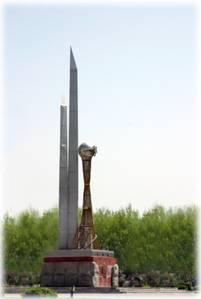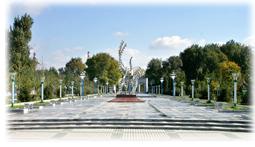 Criminal Inverstigation Police University of China (CIPUC) is a higher education institution subordinate to the Ministry of Public Security of P.R.China, which was founded in May 1948 and has devoted itself to train the personnel and specialists in the field of criminal investigation and forensic science. It started undergraduate enrolment in 1982 and is the first police university in China to provide police undergraduate education.
Criminal Inverstigation Police University of China (CIPUC) is a higher education institution subordinate to the Ministry of Public Security of P.R.China, which was founded in May 1948 and has devoted itself to train the personnel and specialists in the field of criminal investigation and forensic science. It started undergraduate enrolment in 1982 and is the first police university in China to provide police undergraduate education.
CIPUC offers 10 undergraduate majors including Criminal Investigation, Economic Crime Investigation, Public Order Management, Narcotics Control, Criminal Intelligence, International Policing Studies, Cyber Security and Law Enforcement, Forensic Science, Forensic Audio and Video Technology and Police Canine Training. Among those, Criminal Investigation, Forensic Science and Information Security that developed into Cyber Security and Law Enforcement later are national-level characteristic specialties.
In 1998, CIPUC obtained the approval of the State Council on awarding master’s degrees and then started postgraduate enrollment. With regard to postgraduate education, there are 3 first-level disciplines in Law, Science of Public Security and Technology of Public Security, 3 second-level disciplines in Analytical Chemistry, Computer Applied Technology and Forensic Medicine, as well as 4 professional degrees in Juris Master, Master of Policing, Master of Applied Psychology and Master of Public Administration.
 The university has set up many MPS-level, provincial-level and municipal-level training centres, research centres and laboratories including ‘Operational Technology Base of the MPS’, ‘Narcotics Control of the MPS’,‘Key Laboratory for Questioned Document Examination and Identification of the MPS’ and ‘Key Laboratory for Impression Evidence Examination and Identification of the MPS’ and so on.
The university has set up many MPS-level, provincial-level and municipal-level training centres, research centres and laboratories including ‘Operational Technology Base of the MPS’, ‘Narcotics Control of the MPS’,‘Key Laboratory for Questioned Document Examination and Identification of the MPS’ and ‘Key Laboratory for Impression Evidence Examination and Identification of the MPS’ and so on.
In 1998, CIPUC obtained the approval of the State Council on awarding master’s degrees and then started postgraduate enrollment. With regard to postgraduate education, there are 3 first-level disciplines in Law, Science of Public Security and Technology of Public Security, 3 second-level disciplines in Analytical Chemistry, Computer Applied Technology and Forensic Medicine, as well as 4 professional degrees in Juris Master, Master of Policing, Master of Applied Psychology and Master of Public Administration.
The total No. of CIPUC staff reaches to 750 including 380 full-time teachers and the number of associate professors or above is 221. The total No. of students is approximately 6,000, including full-time undergraduates, postgraduates and in-service police trainees. In the past 68 years, CIPUC has developed a school-running mode of integrating teaching with research and case handling. Upholding the school spirit of ‘Loyalty, Honesty, Unity, Endeavour’ CIPUC has cultivated more than 100,000 cadres, personnel and specialists for judicial and public security organs, and has been named ‘the Top Police University of China’ and ‘the Cradle of Oriental Sherlock Holmes’.
 CIPUC actively carries out international academic exchanges and cooperation, and has already established friendly and cooperative relationships with higher education institutions and police organisations in more than 10 countries including the United States, Canada, the United Kingdom, Germany, France, Netherlands, Russia, Serbia, Australia, the Republic of Korea and Singapore, as well as in Hong Kong Special Administrative Region, Macao Special Administrative Region and Taiwan Province. In addition, CIPUC holds a large-scale International academic conference every year. Through the student exchange programmes with foreign universities such as Ulster university in the UK and Charles Sturt University in Australia, CIPUC cultivates multi-skilled policing talents with double bachelor’s degrees. Being entrusted by the Ministry of Commerce and the Ministry of Public Security, the university commenced to undertake police trainings for foreign countries from 2007 and have trained almost a thousand criminal investigation specialists for about 70 countries.
CIPUC actively carries out international academic exchanges and cooperation, and has already established friendly and cooperative relationships with higher education institutions and police organisations in more than 10 countries including the United States, Canada, the United Kingdom, Germany, France, Netherlands, Russia, Serbia, Australia, the Republic of Korea and Singapore, as well as in Hong Kong Special Administrative Region, Macao Special Administrative Region and Taiwan Province. In addition, CIPUC holds a large-scale International academic conference every year. Through the student exchange programmes with foreign universities such as Ulster university in the UK and Charles Sturt University in Australia, CIPUC cultivates multi-skilled policing talents with double bachelor’s degrees. Being entrusted by the Ministry of Commerce and the Ministry of Public Security, the university commenced to undertake police trainings for foreign countries from 2007 and have trained almost a thousand criminal investigation specialists for about 70 countries.


